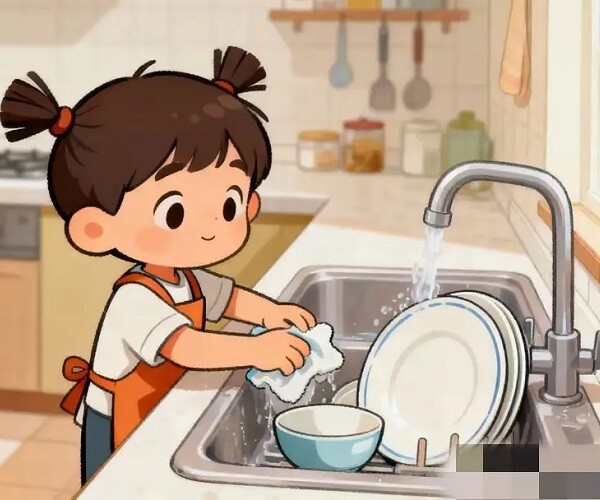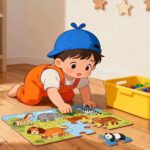On the contrary, when children are trained in five core habits, they will build an important foundation: self-discipline, independence, goal-oriented thinking, and a sense of responsibility. These abilities bring enormous “hidden benefits,” far exceeding any material rewards.
That’s why five simple yet essential habits are something that any ordinary family should persistently cultivate in their children. They are not costly, do not require special conditions, but can benefit children throughout their lives.


Doing Things Independently: Transitioning from Dependence to Independence
A 10-year-old child, but parents still take care of every little detail: helping them get dressed, preparing their schoolbag, and cleaning up toys.
When the child forgets their homework, parents rush to take them to school, reminding them along the way: “Don’t forget next time!”
If the child argues with a friend, parents immediately step in to resolve it, while the child just stands there, not knowing how to handle it themselves.
Science proves that overprotection hinders a child’s independence. The period from 0 to 12 years is particularly crucial for developing life skills and a sense of responsibility. The more parents do for their children, the more dependent they become, and the weaker their future independence. It’s like learning to ride a bike: if parents always hold their hand, the child will never learn to balance on their own.
Studies on executive function show that children trained to complete small daily tasks (getting dressed, cleaning up, planning) before the age of 12 will adapt and solve problems better as adults. Because from a young age, they are accustomed to taking responsibility, never relying on others to keep up.
Practical suggestions:
By age: Children aged 6-8 can dress themselves, prepare their schoolbag, and clean up toys.
Children aged 9-12: can wash their socks, fold blankets, and plan their spending.
Let children face consequences: If they forget their homework, don’t send it for them; let them explain to the teacher.
If they lose a toy, don’t buy a new one immediately; let them use their allowance to buy a new one, learning to check and value their belongings.
Encouraging guidance: When children complete tasks independently, don’t just say, “You’re so good!” Be specific, for example: “Today you prepared your schoolbag, much faster than yesterday!” helping them feel confident that “I can totally do it.”


Completing Tasks Today: A Breakthrough from Procrastination to Self-Discipline
The child says, “I’ll play for 10 minutes before doing homework,” but ends up playing until bedtime before remembering.
Or they delay weekend homework until Sunday night, doing it while crying.
The child promises, “Tomorrow I’ll go running early in the morning,” but the next morning they stay in bed, saying, “Just 5 more minutes.”
Psychological studies on delayed gratification show that children who control immediate impulses (e.g., doing homework before playing) tend to concentrate better and have a long-term goal orientation. Conversely, children who procrastinate often think, “I’ll do it later,” and end up accomplishing nothing.
A Stanford University study found that children who develop the habit of “doing today’s work today” before the age of 12 achieve better academic and career results as adults. Because they understand that: “The problem won’t go away until the task is completed,” they proactively plan and manage their time effectively.

Practical methods:
Task breakdown: Divide large tasks into smaller steps. For example, writing an essay becomes: outline → introduction → body → conclusion. Mark each completed step to help children feel progress and stay motivated.
Time limits: Agree with the child: “Homework should be done in 40 minutes.” When time’s up, put the books away, even if it’s not finished, continue the next day. Children will learn that procrastination doesn’t yield results.
Lead by example: Parents practice “doing today’s work today” (not delaying tasks). Children will follow and develop self-discipline.

Reading Habit: Transitioning from Passive Input to Active Thinking
Many children prefer watching movies or TV, showing little interest in books or skimming through pages and forgetting the content immediately.
Three ways to help children develop an effective reading habit:
Fixed reading time: Dedicate 30 minutes to reading every night before bed. The whole family can read together, or parents can read to the children. A consistent habit helps children see reading as a natural part of the day.
Based on interests: If the child loves dinosaurs, choose dinosaur picture books. If they’re interested in space, select space science books. Start with what they’re passionate about to nurture a love for reading.
Read and discuss: After reading, engage in open-ended conversations: “Do you think the main character did the right thing?” or “What would you do if you were them?” This helps children remember better and develop critical thinking skills.


Exercise Habit: Building a Foundation from Weakness to Strength
Many children dislike physical activity, preferring to stay indoors, or often complain of tiredness and give up quickly during exercise.
Ways to help children love physical activity and build perseverance:
Family exercise day: Choose a fixed day each week for the whole family to exercise together, such as cycling, playing badminton, or jumping rope. When parents participate, children see exercise as a bonding activity, not a chore.
Turn exercise into a game: Make physical activity fun by organizing jump rope competitions, relay races, or balance challenges. When children find exercise enjoyable, they’ll be more motivated.
Track perseverance: Plan a 21-day exercise routine with the child, marking each completed day with a sticker. Seeing their growing streak will motivate them to maintain the habit and learn endurance.


Emotion Management: Bridging from Irritability to Calmness
Many children get angry over small things or burst into tears when faced with difficulties.
Three ways to help children learn emotion management:
Calm corner: Create a small corner with soft cushions, stuffed animals, or calming toys. When children are angry, guide them to the calm corner to self-soothe instead of lashing out.
Emotion journal: Each day, draw emotion symbols like happy, sad, or angry, and record: “How did you feel today?” This helps children identify and express their emotions better.

Deep breathing technique: When children are angry, teach them to breathe in, hold, and breathe out three times. Slowing down their breathing helps calm their emotions and regain composure.
In parenting, what matters most is not money, but habits. Overindulgence before the age of 12 can lead to bad habits like dependence, procrastination, and lack of planning. Conversely, appropriate strictness during this period helps children develop good habits: independence, self-discipline, love for reading, enthusiasm for exercise, and emotion management. These habits are formed through consistent companionship and guidance from parents.






































